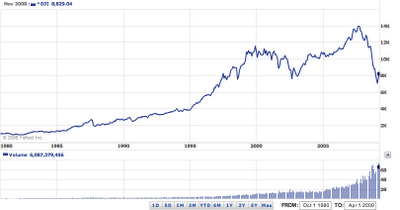Crisis for dummies: Consumer inflation vs Asset inflation

The point I will make is quite trivial to understand yet devilishly hard to implement.
When people talk about "inflation" they usually talk of the Consumer Price Index. The CPI includes things such as the price of eggs, milk, clothing etc. It used to include gas but since that number varies too much it has been taken out. CPI is inflation ex-inflation.
Very funny, but CPI is more than misleading, it believe it does not capture real monetary inflation. For a simple reason, a lot of the money created goes to blow asset bubbles. Asset bubbles are not captured in CPI. They masquerade as growth.
Let me ask you, have you ever wondered why the increase in the price of buying a house is not reported as inflation but as economic growth? It is because it is an asset, not an expense. If the price of the asset rises, you rise with it. So saying "the price of housing has risen 10% a year for the past 10 years" does not translate to "the cost of living has risen 10% a year" in the minds of people. At least for those that have a house it translate as "I am richer by 10% every year".
But I was in Silicon Valley in 2000. I had no house. I watched in horror as I could not even afford rent anymore. I had to move out. I had a wife, a baby and a dog and I was completely priced out. And wasn't that inflation? I mean MONETARY INFLATION? Theory says that "inflation is always and everywhere a monetary phenomenon". As more debt got issued and cheaper, more people bid on houses, so the prices went up, prompting more people to get more debt because the prices were going up on the assets and were good return on investment. This was a feedback loop that resulted in brutal exclusion of those that had not by those that had. Blame the boomers again. My generation was fundamentally fucked, we were paying $750k for shitty working class houses in silicon valley.
When the tide goes us, if you have a boat, you float with your boat. That means that when monetary levels go up, if you have a house or any asset, your house will appreciate with the rest, you are floating what I call inflation you call "getting rich". You are not getting richer, as all the houses are going up, but in a sense you are, and it feels like you are. I remember with disgust the glee on people's faces as they talked about how much their houses were worth, "A MILLION", they wanted you to be impressed, they considered it "success". If you have no boat, then you drown, meaning if you have no house to house-jump then getting your first house is increasingly difficult. To the point of being impossible. This is fundamentally socially unjust mechanism. He that has gets, but not by work, or the work of his money, but by the mechanisms of increasing debt money levels. The great divide between rich and poor has been a manufactured reality.
But CPI is what governments use to monitor "inflation". Indeed it is what they use to set monetary levels. But CPI inflation, or lack thereof for the past 10 years, was due to China exporting deflation. That kept a tight lid on consumer prices. So tight that the massive increase in monetary levels did not translate in consumer price inflation. But it translated in MASSIVE ASSET INFLATION (stock market and housing). Bubbles were not cause for tightening the supply. Greenspan was famous for saying that it was not the role of the FED to prick asset bubbles.
I am fond of the following chart: DJI since 80 in LINEAR SCALE. That is the drawing above. Yes it is NOT on log for a reason, that the dips actually point to a very linear growth for the US economy on average. This makes more sense to me than a exponential growth. The first dip in 2000 and the second one RIGHT NOW at 8500 say that we are back ON TREND. TREND BEING LINEAR. EVERYTHING IN BETWEEN MAY HAVE BEEN MONETARY INFLATION.


Comments
BTW: I'm at Jazoon right now and thinking these Java conferences aren't the same without you. :(
from wikipedia:
http://en.wikipedia.org/wiki/Austrian_Business_Cycle_Theory
The monetary boom ends when bank credit expansion finally stops - when no further investments can be found which provide adequate returns for speculative borrowers at prevailing interest rates. Evidently, the longer the "false" monetary boom goes on, the bigger and more speculative the borrowing, the more wasteful the errors committed and the longer and more severe will be the necessary bankruptcies, foreclosures and depression readjustment.[18]
Ludwig von Mises[22] and Friedrich Hayek[23] warned of a major economic crisis before the Great Depression. Hayek made his prediction of a coming business crisis in February 1929. He warned that a financial crisis was an unavoidable consequence of reckless monetary expansion.[24]